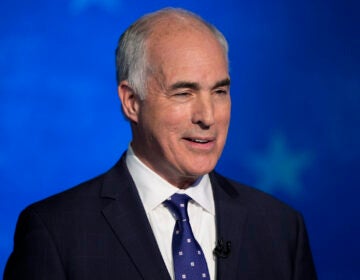Does Trump want to eliminate affirmative action for minority businesses? Here’s what we know
After hours of speeches at the Republican National Convention and pages of policy documents — there’s no mention of affirmative action policy changes by Republicans.
Listen :58
Republican presidential candidate former President Donald Trump speaks during a presidential debate with President Joe Biden, Thursday, June 27, 2024, in Atlanta. (AP Photo/Gerald Herbert)
What questions do you have about the 2024 elections? What major issues do you want candidates to address? Let us know.
Boosting the economy was the key issue during the Republican National Convention in Milwaukee this week.
Plans to reduce inflation, cut taxes, create good jobs, reviving American manufacturing and others were part of the national policy platform greenlit by the Republican presidential nominee Donald Trump.
But affirmative action for businesses isn’t part of that plan, which some say leaves many minority communities behind.
The Republican National Committee didn’t include any minority contracting or U.S. Small Business support programs as part of its policy agenda. But the Trump campaign says that he will create policies to build generational wealth for minority families.
“By reducing regulations, implementing tax cuts, lowering inflation, and creating quality jobs, his administration created a more favorable environment for entrepreneurship and job growth in our communities,” said Janiyah Thomas, the Black Media Director for the Trump Campaign in a statement to WHYY News.
Likewise, senior campaign advisor Steven Cheung said in a statement, Trump “created an environment where diversity, equal opportunity, and prosperity were afforded to everybody.”
The Republican National Committee’s policy platform includes sweeping changes meant to spur the economy that mirror Trump’s plans: curbing inflation, industry deregulation, restoring the American manufacturing sector and tax cuts.
“The Republican Party must return to its roots as the party of industry, manufacturing, infrastructure and workers,” according to the RNC’s policy framework.
But it’s unclear what the Republican National Committee’s stance might be on affirmative action policies for businesses — such as minority contracting goals for federal agencies — because the 28-page document doesn’t address it.
The Trump campaign’s policy platform includes the same issues as the Republican National Committee policies, which do not directly address any minority contracting programs, contract set-asides or access to capital support.
But Project 2025, a Republican policy platform pushed by conservatives, including former Trump officials, does address race-based preferences for small business support and government contracts.
Thomas Gilman served in the Trump Administration as the assistant secretary for administration in the Department of Commerce. During Trump’s presidency, he sought to defund the Minority Business Development Agency entirely, which Gilman said “has the appearance of perpetuating racial bias by focusing on minority advancement rather than economic need.”
Gilman outlined Project 2025’s proposal to change the mission of the Minority Business Development Agency to analyze policy of regulations and taxes on minority businesses, enact consequences for any poor performance of business centers, use the agency as a data and research hub for minority businesses and evaluate unfair trade practices on minority businesses.
Likewise, Project 2025 contributor and CEO of the small business and entrepreneurship council, Karen Kerrigan, proposed restructuring the U.S. Small Business Administration away from historically disadvantaged business support.
Kerrigan criticized that the SBA has “moved from being open to any eligible small business searching for support to being hyper focused on disproportionately impacted, politically favored, or geographically situated small businesses and entrepreneurs.”
She proposed that the SBA end direct lending to small businesses and that all businesses should qualify for support on a “first-come, first-serve basis.”
A popular business development program run by the SBA was forced to remove race-based consideration for support after a federal judge struck down a rule that social disadvantages may be equated with race.
That means everyone had to reapply and prove themselves to have individually been discriminated against, said Amalea Smirniotpoulous, senior policy counsel and co-manager of the NAACP’s Legal Defense Fund’s Equal Protection Initiative, a nonpartisan non-profit.
“So I think that there is a concern that adding this additional barrier could mean that it is harder for people that the program was intended to help [to] actually access those resources,” Smirniotpoulous said. “I’m still waiting to see good data on the impact of these changes on the program moving forward.”
By contrast, the Democratic National Committee’s platform in 2020 emphasized increasing funding for the Minority Business Development Agency and expanding Small Business Administration programs that support women and minority-owned businesses to win federal contracts. In addition, the platform called for strengthening the Community Reinvestment Act, which offers access to credit for women and minority-owned businesses and expands the New Markets Tax Credit and more funding for Community Development Financial Institutions.
The 2024 DNC platform has not yet been released. President Joe Biden’s campaign website does not address minority contracting directly.
But the Biden-Harris Administration announced a goal of increasing the share of federal contracting money to small disadvantaged businesses to 15% by fiscal year 2025.
The Trump campaign touted that under his presidency, the U.S. Small Business Administration supported more than $9.7 billion in lending to minority-owned companies in 2018 – or about 32% of the loan portfolio.
That’s the same percentage as under the Biden-Harris Administration where the SBA supported more than $12.8 billion to minority-owned businesses – about 32% of the loan portfolio.
And that reality is why Wendell Stemley, president for the National Association for Minority Contractors says he’s less interested in policy platforms and more inclined to look at the data.
“You will get more narrative about more enhancements with the Biden Administration to address inequities but then they are dependent on state and local agencies to actually implement those programs,” Stemley said.
Republicans have regularly pushed to eliminate race-based business support programs in the past and turned to the court system to make that happen.
“I think for Republicans they have to get past the mindset that somehow exclusion and being separatists will somehow increase the GDP,” Stemley said.

Get daily updates from WHYY News!
WHYY is your source for fact-based, in-depth journalism and information. As a nonprofit organization, we rely on financial support from readers like you. Please give today.







